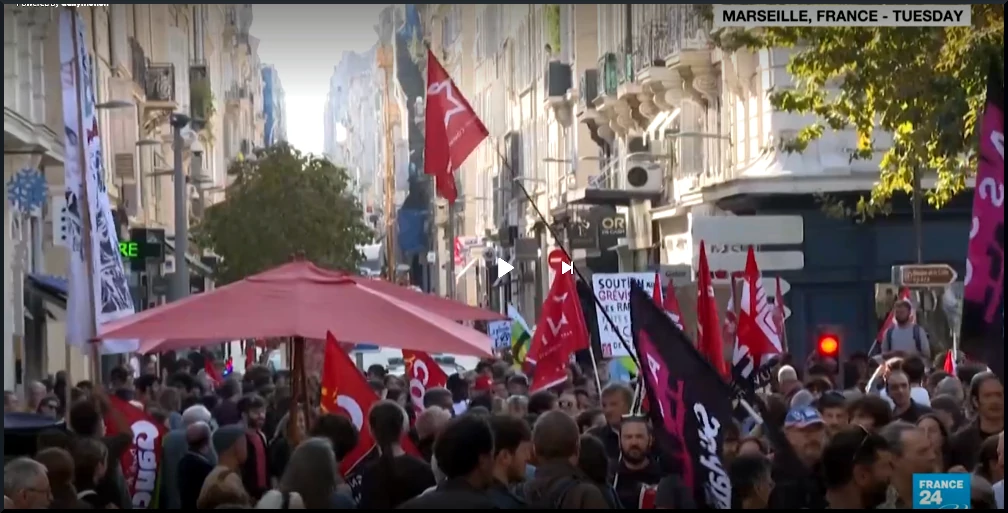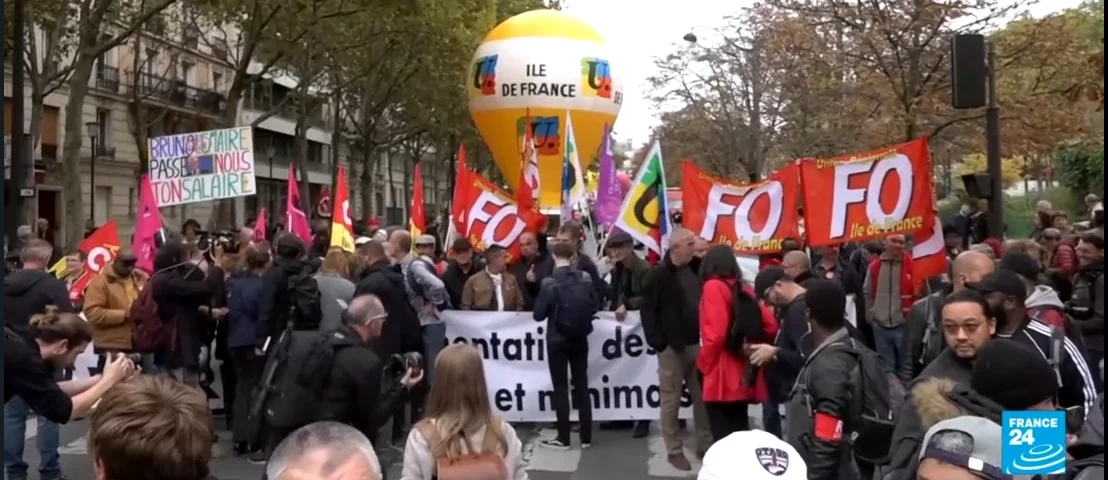by the Countercurrents Collective, published on Countercurrents, October 19, 2022
The Europeans are struggling with the insane response of the EU leadership to the Ukraine War, eagerly sacrificing their welfare to a proxy war in support of U.S. aggression and a deadly proxy war. [jb]
French workers took part in a nationwide strike Tuesday to demand higher wages to keep pace with the soaring cost of living.
The strikes, principally in schools and transport, are an extension of the industrial action that has disrupted France’s major refineries, causing severe fuel shortages.
Half Of All Trains Cancelled
Transport Minister Clement Beaune said today there were severe disruptions to national rail services with half of all trains cancelled, and Paris’s suburban train and bus services were also heavily hit.
The Eurostar rail service announced that it had to cancel certain trains between London and Paris due to the work stoppage.
Workers in the civil service, healthcare, and the food and energy sectors also walked out as the unions mounted the biggest challenge to the French President Emmanuel Macron since his re-election in May.
10 Nuclear Power Plants Hit With Strike
A representative of the FNME mine and energy union, which is affiliated to the CGT union confederation, said earlier this week that its strikes have already hit work at 10 French nuclear power plants and delayed maintenance work at 13 reactors.
Tuesday’s mass walkout comes after workers at several refineries operated by energy giant TotalEnergies voted to extend their four-week-old strike action in defiance of the government’s instructions to go back to work.
While the oil giant struck deals with two other unions last week, members of CGT are holding out for a 10 per cent pay rise, citing the cost-of-living crisis and huge profits made by the firm.

Oil Refineries
Three out of seven of the country’s oil refineries and five major fuel depots have been severely hit by the dispute.
French Finance Minister Bruno Le Maire said on Monday: “The time for negotiations is over.”
Government Orders: Return To Work
The French government has already ordered workers at the Mardyck depot in the north of France to return to work and it is threatening to use the same strong-arm tactic with workers at the Feyzin depot in the south-east.
Ahead of the today’s action, CGT general secretary Philippe Martinez told L’Humanite that, because Mr Le Maire had challenged the union, “blocking the country is perfectly acceptable.”
From the picket line at Porte d’Italie in Paris, Mr Martinez said: “All workers must receive a wage increase. Workers will decide whether to renew the strike or not.”
About 130,000 people also took to the streets of Paris on Sunday to protest against soaring prices.
The leader of La France Insoumise (France Unbowed) Jean-Luc Melenchon marched alongside this year’s Nobel Prize winner for Literature Annie Ernaux.
High Inflation Triggers National Strike
Other media reports said:
The national strike in France on Tuesday has seen trains canceled and schools closed as trade unions demand higher salaries for workers amid soaring inflation and an energy crisis.
According to one of the country’s largest trade unions, CGT, the protesters are calling for “an increase in wages, pensions and social minimum, and the improvement of living and study conditions.”
Huge Profits
CGT explained in a statement that today’s industrial action is an extension of the weeks-long refinery strike that has closed gas stations across the country. The trade union accused management of oil giants – Total and Exxon in particular – of “making huge profits” while ignoring the demands of employees hit by the cost-of-living crisis.
Public And Private Sectors
As the protest movement is picking up steam not only in the energy industry but across “both public and private sectors,” the union said that now is the time for “employees, retirees, the unemployed and young people” to join the industrial action.
6% Inflation
France’s inflation rate currently exceeds 6%, while almost all of the country’s industrial sectors have recorded a drop in activity due to the burgeoning energy crisis, which has been exacerbated by anti-Russia sanctions and the sharp decrease in Russian energy supplies.
Maritime transport could also be impacted, as several ports and docks announced that they would cease working for several hours on Tuesday.
The strike has forced some schools to close as the first official figures from the Education Ministry show that about 6% of teachers are participating in the action. The number is particularly high at vocational high schools, where the participation rate has reached almost 23%.
Several cities, including Paris, Bordeaux and Rennes, have seen huge number of people take part in rallies.
Christophe Bechu, the minister for ecological transition, told Europe 1 that strikes are further aggravating a state of affairs that is already difficult enough due to “the war in Ukraine” and the broader economic situation.
Police Violently Crack Down On Protesters
Massive protests against the high cost of living met with a heavily-armed police crackdown in Paris on Tuesday. Tens of thousands of striking union members and their supporters filled the city streets to denounce President Emmanuel Macron’s economic policies and demand better wages in the face of massive inflation.

A video posted to social media shows a crowd of heavily armored riot police charging a cluster of demonstrators sheltering behind a makeshift barricade. While the protesters scatter almost immediately, the cops carry off a few of them, while protesters toss projectiles at them.
Another clip shows police whacking demonstrators with their batons and drenching them in pepper spray while others trade blows with protesters.
Protests against Macron’s government and its policies have been ongoing since last month, when employees at TotalEnergies and Esso-ExxonMobil demanded a salary bump of over 10% to compensate for high inflation. The resulting strike took a third of France’s gas stations out of service, causing long lines to fill up at the remaining locations. Tuesday’s demonstrations included an official action by the General Confederation of Labor, with transit workers, as well as auto plant and power plant workers, taking to the streets alongside the refinery and gas station workers and their supporters.
With inflation at 6%, the cost of food and other necessities has become a heavy burden for the average worker. Energy costs have soared due to sanctions on Russian gas.
Strikes, Protests In Europe Over Cost Of Living And Pay
A Reuters report said:
European countries are facing more strikes and protests due to high energy prices and mounting costs of living. Here are details of some industrial actions and demonstrations.
France
Regional train traffic in France was cut by about half on Tuesday as several unions called a nationwide strike. They are seeking to capitalise on anger with decades-high inflation to expand weeks of industrial action at oil refineries to other sectors. There was also some disruption to schools as the strike primarily affected the public sector.
Thousands of people took to the streets of Paris on Sunday to protest against soaring prices.
Britain
About 1,000 GXO drivers in Britain will take strike action over five days from the end of the month in a dispute over pay, the Unite union said on Tuesday, warning of disruption to beer deliveries.
Hundreds of workers at the port of Liverpool, one of Britain’s largest container ports, are due to take two more weeks of strike action over pay and jobs from Oct. 24. The Communication and Workers Union, representing 115,000 Royal Mail postal workers, held strikes in September and early October, and have threatened more strikes after months of failed negotiations over pay and operational changes.
More than 300,000 members of Britain’s largest nursing union have begun voting over a strike to demand a pay rise. Junior doctors and ambulance workers also plan to ballot over pay disputes. Rail workers have also walked out over disputes over pay and job security.
Germany
Pilots at Lufthansa’s Eurowings began a three-day strike over working hours on Monday, their union said, affecting tens of thousands of the budget airline’s passengers. The walkout is due to end at 2159 GMT on Oct. 19.
Hungary
Thousands of Hungarian students and parents protested on Oct. 14 in the second major rally in two weeks to support teachers who have been fired for joining strike action for higher wages, and more teachers being warned of dismissal.
Czech Republic
Tens of thousands of Czechs protested in Prague on Sept. 28 against the government’s handling of soaring energy prices and the country’s membership of NATO and the European Union. The demonstration was organised by far-right and fringe groups and parties including the Communists.
Belgium
Thousands took to the streets in Brussels on Sept. 21 to protest at soaring energy prices and the cost of living. A similar protest in June drew around 70,000 Belgian workers.
